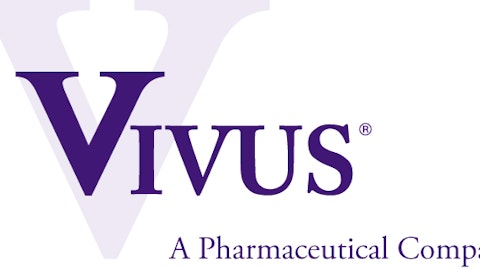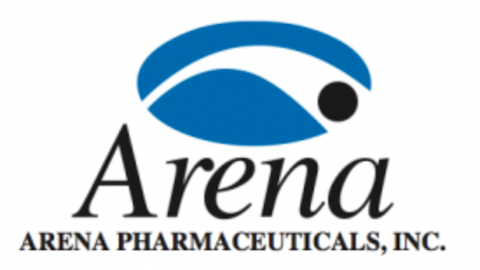
A Look Back At Recent History
Arena Pharmaceuticals, Inc. (NASDAQ:ARNA) rose 700% and VIVUS, Inc. (NASDAQ:VVUS) climbed by more than 250% in the year prior to July 2012. Both companies saw FDA approvals near the same time, which then triggered a very abrupt downtrend.
Since July 2012, VIVUS, Inc. (NASDAQ:VVUS) has fallen 44%, and Arena Pharmaceuticals, Inc. (NASDAQ:ARNA) by nearly 35%, as sales expectations have fallen just as rapidly. In addition, each company had its own fair share of problems.
Shared Revenue on a Bad Product
Arena Pharmaceuticals, Inc. (NASDAQ:ARNA)’s Belviq was the first FDA-approved weight loss drug, but launched several months behind Qsymia. Arena is partnered with Eisai, and only receives up to 35% of total sales. Therefore, Arena Pharmaceuticals, Inc. (NASDAQ:ARNA)’s July 2012 market cap over $2 billion has trickled lower, as the market realizes that a portion of sales does not justify such a large valuation.
Moreover, Belviq is not that effective; Consumer Reportsstated that patients should “skip it” and to “eat less and exercise”. Such a report can be crippling to a consumer product, which is evident by the slow growth of Belviq prescription sales.
High Costs & Expensive Restrictions
VIVUS, Inc. (NASDAQ:VVUS)’ Qsymia faced problems from the very start, as a warning for expected mothers or those taking birth control kept it out of retail pharmacies. Since Qsymia caused birth defects, it had to be sold in specialty phamas. In addition, VIVUS, Inc. (NASDAQ:VVUS) could not market the product nationally.
One bright spot is that Vivus has worked with regulators on these restrictions, and now finds itself in 8,000 pharmacies. This could lead to higher sales, and should boost awareness and increase insurance coverage. In fact, Qsymia does work about three times better than Belviq at producing weight loss. But its ingredients can be prescribed separately, and for just a fraction the cost.
Not Meeting Expectations, and Facing New Competition
When Belviq and Qsymia were first approved, investors were optimistic. Obesity is the number one health risk in America, which creates a large market opportunity for both Belviq and Qsymia. Yet competition with OTC drugs and questions regarding the two drugs’ efficiency quickly squashed those aspirations of large stock gains.
Clearly, the perception and the outlook for Belviq and Qsymia has changed. But strangely, Orexigen Therapeutics, Inc. (NASDAQ:OREX) has maintained its momentum, and is trading flat since July 2012. In the year prior to July 2012, Orexigen produced gains of 250%. Therefore, Orexigen Therapeutics, Inc. (NASDAQ:OREX) has maintained a two-year 250% return, while VIVUS, Inc. (NASDAQ:VVUS) and Arena Pharmaceuticals, Inc. (NASDAQ:ARNA) have traded significantly more volatile.
Orexigen Therapeutics, Inc. (NASDAQ:OREX)’s product Contrave is believed to work better than Belviq, but not as well as Qsymia. Hence, it is a drug in the middle — but one that is expected to compete directly with Belviq in all retail pharmacies. Therefore, Orexigen investors believe that it could emerge as the winner in the space.
The problem is that Contrave is not yet approved. The company’s drug was effective in a large late-stage study, but the company was asked to conduct a cardiovascular study to judge the drug’s effect on the heart. If successful, Orexigen plans to resubmit the drug to the FDA in late 2013 or early 2014.
Will This Time Be Different?
Right now, the weight-loss drug market lies in shambles. Vivus is fighting with shareholder First Manhattan, who is attempting to replace the company’s entire board. Arena continues to market its drug, but sales are still soft.
Orexigen is trading at 40% of both VIVUS, Inc. (NASDAQ:VVUS) and Arena Pharmaceuticals, Inc. (NASDAQ:ARNA)’s market capitalization, and with its cardiovascular results near, I have to believe that large post-data gains could occur. If so, I urge investors to use recent history as a guide for playing Orexigen.
Right now, there are still risks as to whether or not Contrave will succeed in its study, and I believe the market is placing a high valuation on these uncertainties. Furthermore, stock performance from its potential competitors paint a gloomy picture, and with Contrave, there will be three products on the market.
My advice is to wait. The FDA does not have a history of being liberal, and approving two weight-loss products after more than a decade, and possibly one more this year, is a major step. When you see all that Arena and Vivus have had to endure, you must ask yourself how the FDA will schedule Contrave, if there will be any marketing restrictions, and how long it will take for Contrave to enter the market – if successful in its cardio study.
To me, these are too many questions, and I feel it serves as a good indication that you should use recent history as a guide of what may come.
The article How You Should Play These Weight-Loss Drug Companies originally appeared on Fool.com and is written by Sherrie Stone.
Sherrie Stone has no position in any stocks mentioned. The Motley Fool has no position in any of the stocks mentioned. Sherrie is a member of The Motley Fool Blog Network — entries represent the personal opinion of the blogger and are not formally edited.
Copyright © 1995 – 2013 The Motley Fool, LLC. All rights reserved. The Motley Fool has a disclosure policy.




